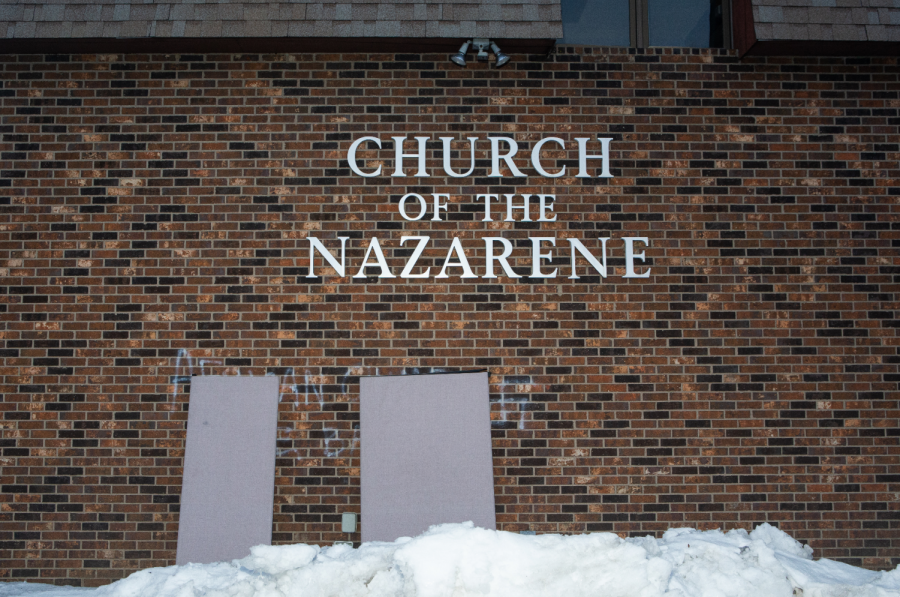Nadler: Combat hate and educate
Racist and hurtful acts, while wrong, present an opportunity to educate others.
The Church of the Nazarene is seen on Monday, March 4, 2019. The church was vandalized with derogatory racial slurs and swastikas.
March 10, 2019
Few things are as cringeworthy to me as hearing about or seeing an anti-Semitic act. Growing up in a Jewish household, I was always taught to defend myself whenever I faced any microaggressions or anti-Semitic acts. I was also always taught to take the high road — two wrongs do not make a right. If I receive hate, I can right it by teaching someone else how it affects me. Luckily, I rarely faced many anti-Semitic occurrences, but this is not to say that I won’t call out anti-Semitism for what it is when I witness it.
Last weekend, the Church of Nazarene in Iowa City was vandalized. A swastika, racist remarks, and Bible verses were spray painted on the bricks of the church building. An act of racist vandalism occurring in Iowa City terrifies me. The vandalism the Church of Nazarene had to experience is simply unfair and unjust. The church should be respected just like every other religious place of worship. While the act occurred on a Christian church, the use of a swastika to vandalize a holy place is also an act of anti-Semitism.
RELATED: Guest Opinion: You’re right, Business Leaders in Christ, I do not have the right to exist
Moreover, the use of a swastika to incite a group of people emphasizes to me that racism and anti-Semitism are still prevalent today. The swastika is the symbol of the German Nazi Party. For someone such as me who has relatives that survived the Holocaust, in which 6 million Jewish people were murdered, the swastika symbolizes fear, persecution, and hate. Seeing a swastika in my hometown reminds me that there are people who absolutely despise the Jewish people.
People who use vandalism to spread hate should not be tolerated. We must come together as a community to recognize acts of hate, big or small, and call them out. While this may be challenging, we must take this fear-inducing behavior and view it as a chance to educate others.
RELATED: Jaimes: Lent and the college Christian
I believe one of the best ways to unite people and rid our communities of hate is spreading knowledge and teaching others about the impact of their actions. The person who vandalized the Church of Nazarene, while still unknown, needs to be educated about how the swastika has incited hate, and how this action has affected the Church of Nazarene and the broader religious community.
I hope the Church of Nazarene overcomes this hateful act by using it as a moment to further unite the church, educate others, and commit to refusing to tolerate hateful and racist acts. I wish for those who commit such acts to become more educated on the symbolism and impact of hateful acts. I urge the Iowa City community to learn how to recognize acts of hate and leverage these actions as an opportunity to learn and grow together.






















